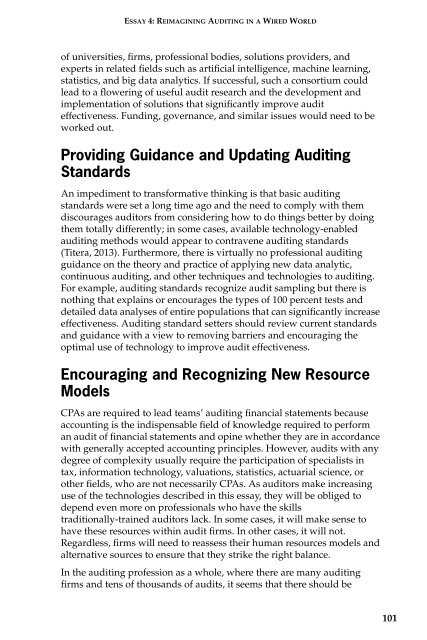AUDIT ANALYTICS AUDIT
1JWn3ix
1JWn3ix
You also want an ePaper? Increase the reach of your titles
YUMPU automatically turns print PDFs into web optimized ePapers that Google loves.
ESSAY 4: REIMAGINING <strong>AUDIT</strong>ING IN A WIRED WORLD<br />
of universities, firms, professional bodies, solutions providers, and<br />
experts in related fields such as artificial intelligence, machine learning,<br />
statistics, and big data analytics. If successful, such a consortium could<br />
lead to a flowering of useful audit research and the development and<br />
implementation of solutions that significantly improve audit<br />
effectiveness. Funding, governance, and similar issues would need to be<br />
worked out.<br />
Providing Guidance and Updating Auditing<br />
Standards<br />
An impediment to transformative thinking is that basic auditing<br />
standards were set a long time ago and the need to comply with them<br />
discourages auditors from considering how to do things better by doing<br />
them totally differently; in some cases, available technology-enabled<br />
auditing methods would appear to contravene auditing standards<br />
(Titera, 2013). Furthermore, there is virtually no professional auditing<br />
guidance on the theory and practice of applying new data analytic,<br />
continuous auditing, and other techniques and technologies to auditing.<br />
For example, auditing standards recognize audit sampling but there is<br />
nothing that explains or encourages the types of 100 percent tests and<br />
detailed data analyses of entire populations that can significantly increase<br />
effectiveness. Auditing standard setters should review current standards<br />
and guidance with a view to removing barriers and encouraging the<br />
optimal use of technology to improve audit effectiveness.<br />
Encouraging and Recognizing New Resource<br />
Models<br />
CPAs are required to lead teams’ auditing financial statements because<br />
accounting is the indispensable field of knowledge required to perform<br />
an audit of financial statements and opine whether they are in accordance<br />
with generally accepted accounting principles. However, audits with any<br />
degree of complexity usually require the participation of specialists in<br />
tax, information technology, valuations, statistics, actuarial science, or<br />
other fields, who are not necessarily CPAs. As auditors make increasing<br />
use of the technologies described in this essay, they will be obliged to<br />
depend even more on professionals who have the skills<br />
traditionally-trained auditors lack. In some cases, it will make sense to<br />
have these resources within audit firms. In other cases, it will not.<br />
Regardless, firms will need to reassess their human resources models and<br />
alternative sources to ensure that they strike the right balance.<br />
In the auditing profession as a whole, where there are many auditing<br />
firms and tens of thousands of audits, it seems that there should be<br />
101


